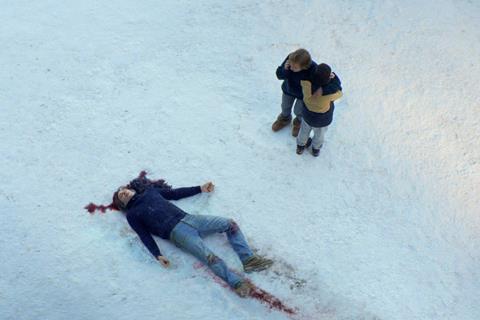Fionnuala Halligan is Screen’s executive editor, reviews and new talent.

Read our other critics’ top tens here.
Top 10
1. Anatomy Of A Fall
Dir. Justine Triet
An extremely hard year to choose, but I’m a sucker for a procedural and Triet’s feminist interrogation manages to layer one into an astute and rousing examination of society’s attitudes to clever women — in this case, one who may also be a killer. Just like the good old days of noir but with a modern twist, and that showcase argument about shared marital responsibilities is a pièce de résistance. Sandra Hüller is fantastic, and Snoop the dog gives Lassie a run for his money.
2. Killers Of The Flower Moon
Dir. Martin Scorsese
This is classic cinema — the Hollywood western reverse-engineered into a searing examination of America’s original sin of greed as manifested against the Osage Nation — delivered with complete craft and the confidence of a master filmmaker who has been surprising audiences for 60 years.
3. All Of Us Strangers
Dir. Andrew Haigh
This, meanwhile, is new cinema: personal, elliptical, elusive, emotional, unexpected. Haigh’s dark, loving fairytale edges the medium forward. (Along with The Zone Of Interest, you won’t see anything more original this year.) Oh, and devastating, thanks to Andrew Scott’s heartbreaking central performance and ballast in an unpredictable world of Paul Mescal, Claire Foy and Jamie Bell.
4. The Holdovers
Dir. Alexander Payne
How do you place a skilful comedy over a groundbreaking Holocaust drama? Lists are cruel mistresses. Payne has all the tools of a Marty-era Paddy Chayefsky in the way he structures his shows: the ease with which this breezes through is wholly deceptive. It is also seasonal and, come on, deck the halls. Paul Giamatti is perfect as the grumpy prep-school teacher left alone in a boarding school with some lonely charges over the festive period; Da’Vine Joy Randolph is appropriately named.
5. The Zone Of Interest
Dir. Jonathan Glazer
Apart from All Of Us Strangers, all in my top five are long: you feel every minute of The Zone Of Interest as a pulse, from the crunching sound design, the palpitating score by Mica Levi, the distant barking of dogs and the blood running off the boots of Auschwitz commandant Rudolf Höss. This is a monumental cinematic achievement from Glazer, whose biting-point restraint is more dangerous and jarring for that constant bearable/unbearable grind throughout.
6. Oppenheimer
Dir. Christopher Nolan
7. Poor Things
Dir. Yorgos Lanthimos
8. Past Lives
Dir. Celine Song
9. Rye Lane
Dir. Raine Allen-Miller
10. American Fiction
Dir. Cord Jefferson
Best documentary
1. 20 Days In Mariupol
Dir. Mstyslav Chernov
Who will speak up when they come for you? The Associated Press correspondent Chernov is in Mariupol, Ukraine as the Russians invade — and the answer is, nobody. Only his camera watches as the lights go out, essential services — from fire engines to hospitals — are targeted repeatedly and the priority becomes to get this footage out, to let the world know of the death and devastation. 20 Days In Mariupol is by far the most impressive, and dangerous, first-person witness to the events of our time.
2. Beyond Utopia
Dir. Madeleine Gavin
On the other side of the coin, Gavin’s documentary about an ‘underground railroad’ for refugees was made without her ever being able to enter North Korea, but the stakes could not be higher for the people who place their absolute trust in her.
3. High & Low: John Galliano
Dir. Kevin Macdonald
I do not believe for a second that there is any real rehabilitation going on — by any person or any entity — in Macdonald’s examination of the disgraced clothing designer, at least as a ‘civilian’ might recognise it, but what a fantastic deep-dive into the venality of fashion at its fiercest.
Performance of the year
Andrew Scott in All Of Us Strangers
Dir. Andrew Haigh
One can only wonder at the depth of collaboration between Scott and his director (and the film’s writer) Haigh that resulted in a performance of such truth. In a film that always wants to slip out of the grasp of being defined or categorised, Scott’s lonely screenwriter Adam is the anchor to physical and emotional reality. Scott himself has been a slippery performer to define, breaking out of television and into his own power on stage and the big screen: this is a big turning point for the talented Irish actor, which should be awarded.















![[L-R]: Amanda Villavieja, Laia Casanovas, Yasmina Praderas](https://d1nslcd7m2225b.cloudfront.net/Pictures/274x183/6/4/1/1471641_pxl_20251224_103354743_618426_crop.jpg)





![[L-R]: Amanda Villavieja, Laia Casanovas, Yasmina Praderas](https://d1nslcd7m2225b.cloudfront.net/Pictures/100x67/6/4/1/1471641_pxl_20251224_103354743_618426_crop.jpg)
No comments yet